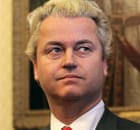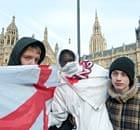Holland's Geert Wilders

Leader of the Freedom party, Holland's third-largest. A deeply divisive figure, Wilders has condemned Islam as a "fascist" ideology and likened the Qur'an to Mein Kampf. Keenly admired by Breivik; unsubstantiated rumours claim he travelled to London in 2010 hoping to meet the Dutchman.
Progress Party of Norway
Under Siv Jensen Norway's second-largest party has campaigned on a restrictive immigration policy. Only those in need of protection according to the UN refugee convention will be allowed to stay. Says that its populist stance has prevented a far-right racist alternative developing in Norway.
Sweden Democrats
Founded in 1988 by Jimmie Akesson and his girlfriend, Louise Erixson, the far-right party won seats in Sweden's parliament for the first time last year. Campaigned on a pledge to try to reduce immigration by as much as 90% and make military conscription compulsory.
English Defence League

Formed from the United Peoples of Luton after a 2009 protest by Muslim extremists against troops returning from Afghanistan. Opposing what it perceives as the spread of Islamic extremism in England, in 2009 it claimed to have "thousands" of members.
Paul Ray
British rightwing blogger based in Malta who might have been an inspiration for Breivik. Denies meeting the gunman and says he was horrified by the mass killings. Also maintains he was not present at the 2002 London meeting of the Knights Templar 'crusaders' which Breivik details in his manifesto.
The Serb
In his manifesto, Breivik says he met "a Serbian crusader and war hero who had killed many Muslims in battle" who was living in exile in Liberia. A fixation with the Balkans is evident within the manifesto, but Srebrenica, above, where Serbs massacred 8,000 Bosnian Muslims in 1995, is not mentioned.